Migrants are always the hardest hit by exploitative working conditions. Lack of interest by Government and some trade unions led to the formation of two independent bilingual trade unions by Latin American workers. The Prisma discussed the legal and political issues with the UVW union.
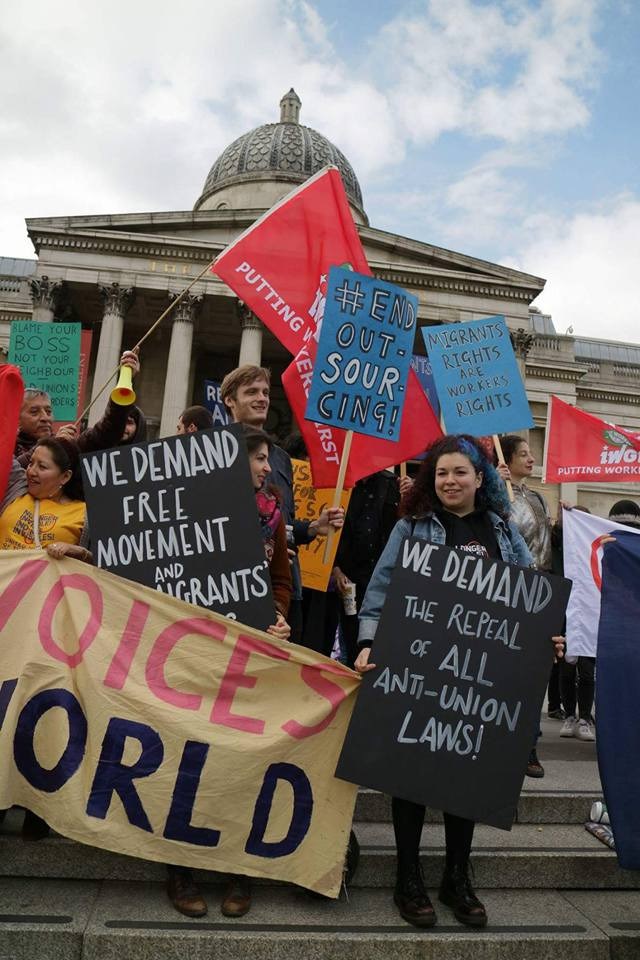 Graham Douglas
Graham Douglas
In London over 100 nationalities are among people including native British workers in precarious conditions, on zero-hour contracts, doing more than one job each day with long unpaid travel times to and between them. Women with children are especially hard-hit, needing to pay for childcare.
The main driver for migrants from Africa and Asia to come to Europe is the availability of work, even at exploitative rates, and in illegal conditions.
Politicians try to blame migrants for social problems but turn a blind eye to the exploitative conditions permitted by current labour laws. Government austerity policies made workers’ pay for the 2008 crisis generated by the global financial elite.
In some cases, established trade unions showed little interest in offering the protection and solidarity that would have come with union membership.
In this situation two small independent unions were formed: United Voices of the World (UVW) in 2014, and International Workers of Great Britain (IWGB) in 2012. Both unions are grass roots organizations founded by Latin American workers in London, both are bilingual in English and Spanish, and offer assistance that includes education and training as well as organizing and campaigning. A third union, Workers of England United (WEU) has formed more recently.
I interviewed Petros Elia, UVW General Secretary, for The Prisma following our recent discussions with film directors on the issues faced by workers in Belgium and Spain.
As UVW approaches its 10-year anniversary, they say: “We are at the forefront of this fight and will continue to develop creative tools to fight against these capitalist exploitative systems”.
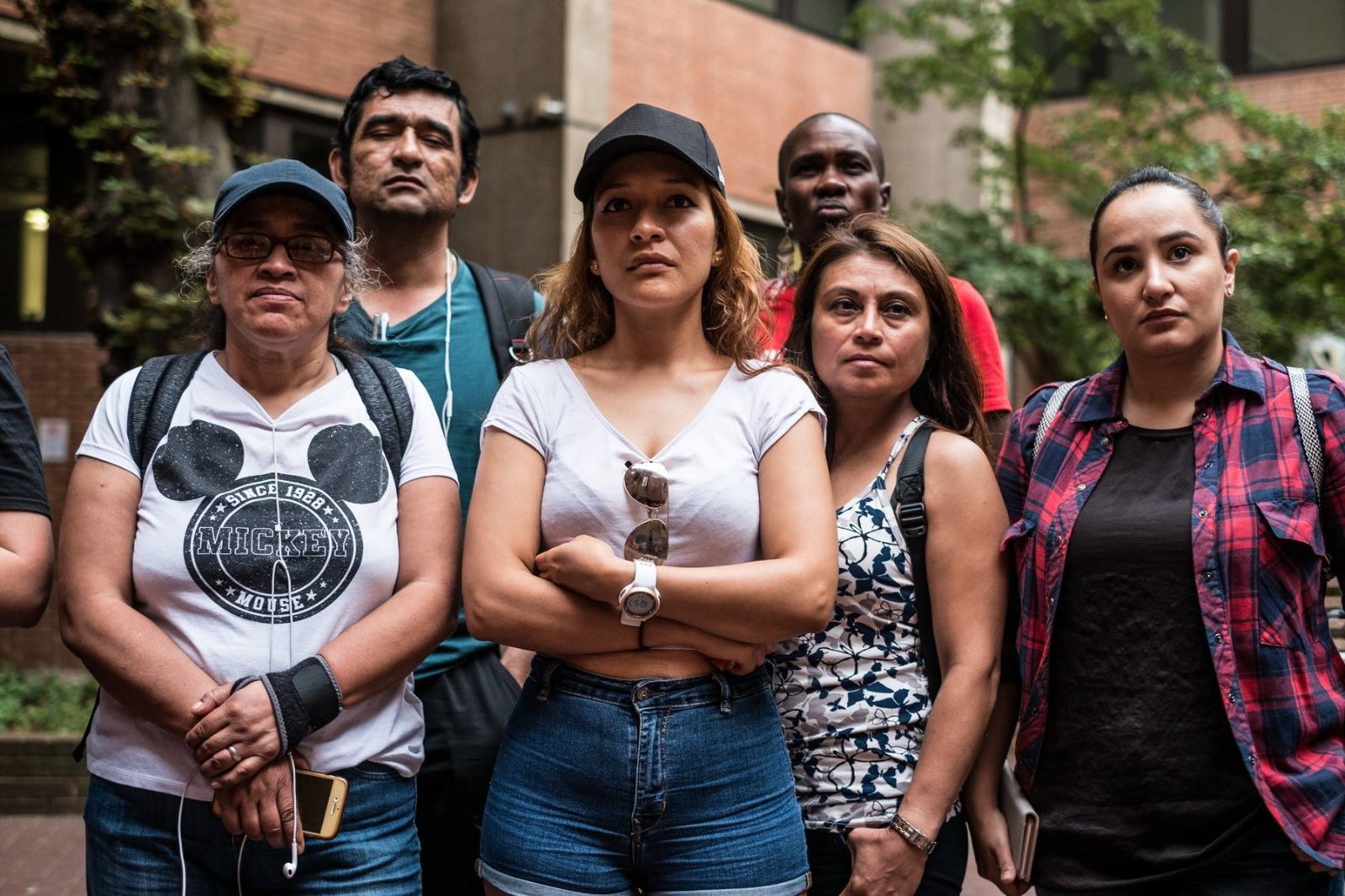 What led your members to form a new union?
What led your members to form a new union?
Necessity. Latin American cleaners in 2014 faced discrimination, poor working conditions, and barriers to accessing support or information on their rights and in need of representation at work.
They founded UVW to make sure that low-paid, precarious, migrant or otherwise marginalised workers in the UK have power at work, enjoy proper pay and conditions, and are treated with dignity, equality and respect. UVW is a constant reminder to big unions that these workers exist and when supported they always fight back because they are mostly outsourced in a de facto two-tiered system and face discriminatory treatment.
What is different in UVW’s work with people in precarious employment?
It is a huge challenge to organise this workforce, because of their poor working conditions. Many do several jobs during unsociable hours so union work is difficult, and many have difficulties speaking English. But without unions like UVW these workers wouldn’t get the tailored support they need to come together, take action and win. UVW is a bilingual and creative union, and we try as much as possible to work around these parameters.
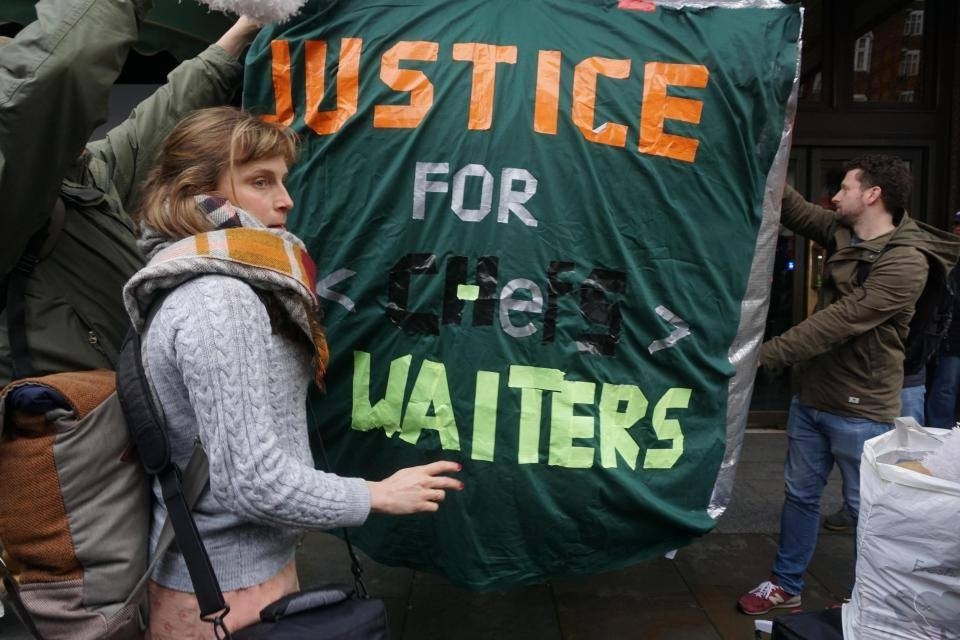 We want to see workers engage in successful struggle, and we try to think creatively about how to make this happen, including recommending workers join larger unions if they might be better supported by them. We have six core values: 1) Unity – we work together; our power lies in the collective strength of our community. 2) Courage – we are bold and fearless; we dare to do things differently. 3) Participation – we are an open member-led union, every member matters, every voice counts. 4) Diversity – we respect each other and value our differences. 5) Creativity – we are inventive and resourceful and adapt to change; our work is serious, and we have fun doing it! 6) Solidarity – we stand together with other struggles that share our vision and values.
We want to see workers engage in successful struggle, and we try to think creatively about how to make this happen, including recommending workers join larger unions if they might be better supported by them. We have six core values: 1) Unity – we work together; our power lies in the collective strength of our community. 2) Courage – we are bold and fearless; we dare to do things differently. 3) Participation – we are an open member-led union, every member matters, every voice counts. 4) Diversity – we respect each other and value our differences. 5) Creativity – we are inventive and resourceful and adapt to change; our work is serious, and we have fun doing it! 6) Solidarity – we stand together with other struggles that share our vision and values.
What sort of relations do you have with the big unions?
From the get-go we have always received support from the rank and file and at times also from the leadership of other unions. Unison Barnet formally endorsed the Sage Nursing Home workers’ demands; Sharon Graham, Unite General Secretary supported the Sage Nursing home dispute and the Great Ormond Street Hospital strike when UVW faced an injunction. In 2021, we partnered with the civil service workers’ union PCS, via its assistant general secretary John Malone during the Royal Parks and the Minister of Justice disputes.
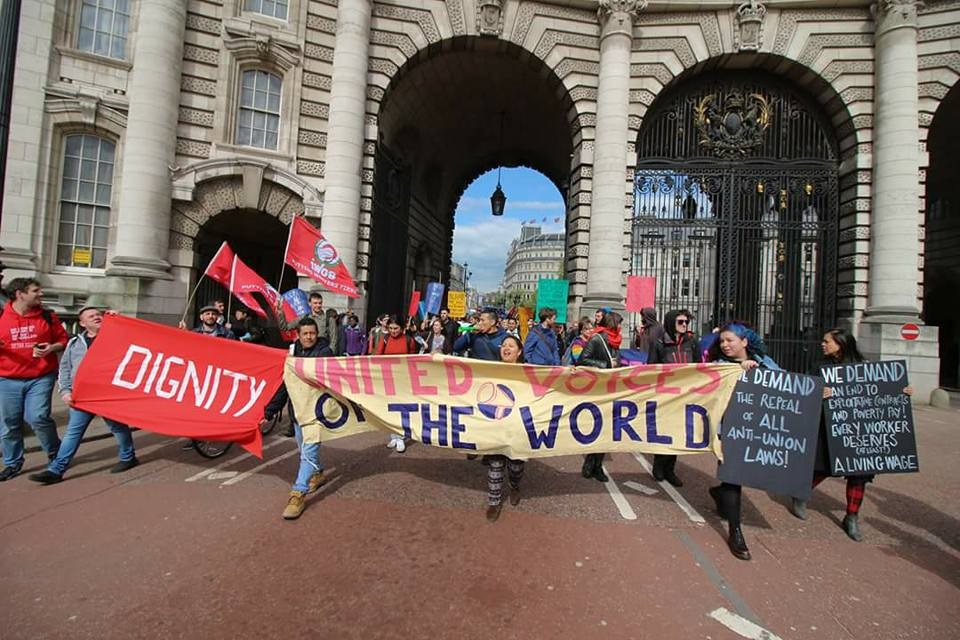 At a local level, we have also coordinated strikes and disputes with PCS at BEIS and with the RMT, the NEU and also smaller unions like IWGB.
At a local level, we have also coordinated strikes and disputes with PCS at BEIS and with the RMT, the NEU and also smaller unions like IWGB.
Currently, we do not have a formal association with the TUC and our relationship with the ‘big unions’ is built from the bottom up via their rank and file and branches. We’ve been given some beautiful solidarity by people in these unions; ASLEF donated thousands to the Great Ormond Street Hospital security guards’ strike fund. Our pickets at the hospital were regularly supported by activists from Unison, Unite, RMT, and NEU. UVW has also stood in solidarity with members from other unions, showing support to them in words and in action, with our members regularly attending other unions’ picket lines too such as UCU, RMT.
The Deliveroo case. Wat is the way forward?
The Supreme Court refused to recognise that Deliveroo riders were workers entitled to statutory employment and trade union protections. It is a massive injustice and a blow to the riders that they do not enjoy these protections. However, this should not deter them from continuing to organise and fight back as they have been doing very impressively for years. We have full confidence they can win their rights through their street battles rather than relying on judges.
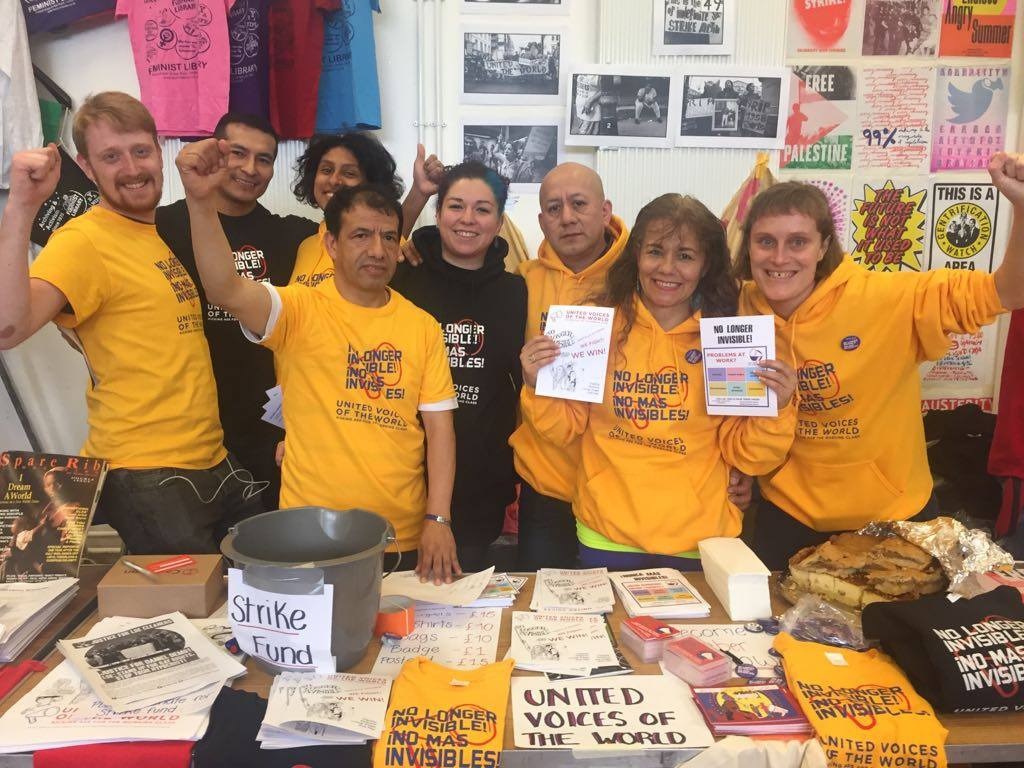 In comparison with the European Union (EU), does Britain need new labour laws?
In comparison with the European Union (EU), does Britain need new labour laws?
The UK needs workers’ power and this is what we fight for in UVW. EU labour laws and regulations are not always better than the UK – in some countries they can be even worse. Workers’ rights need to be strengthened across the board to give them the dignity and respect at work that they deserve.
The UK has some of the lowest rates in Europe for sick pay, annual leave and maternity and redundancy pay, along with unfair dismissal laws, and no protection from being sacked for striking after 12 weeks. Tony Blair boasted that British law was “the most restrictive on trade unions in the Western world.” The union movement is affected by the recently passed anti-union legislation aimed at curbing workers’ ability to fight for better conditions through strike action. We need to get rid of draconian legislation such as the Minimum Services Bill – that will impact the workers in health, education, fire and rescue, border force, nuclear decommissioning and transport – and we need to improve industrial action law covering the notice we give to employers and balloting rules which make it hard for workers to vote and to put pressure on bosses. Taking strike action is not easy and workers and their unions have to overcome many hurdles.
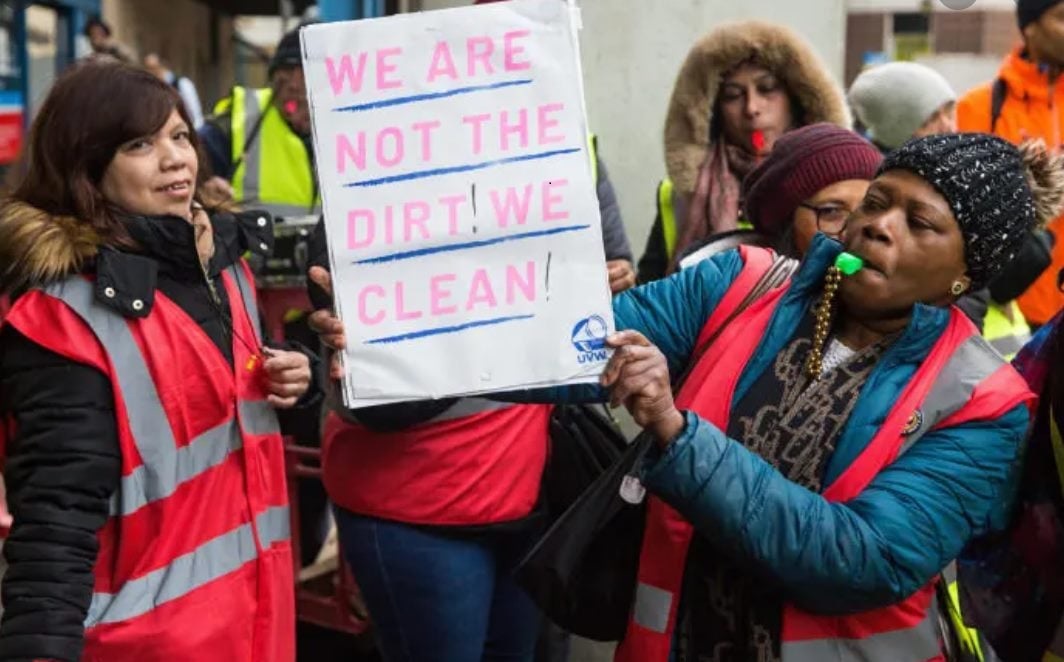 Are there other legal issues that workers face?
Are there other legal issues that workers face?
In addition to better labour laws, we also need to look at legislation such as the Police, Crime, Sentencing and Courts Act 2022 that gives police powers to shut down any protests in the interest of maintaining public order. For unions like UVW whose members take direct action and build leverage campaigns to fight for dignity and respect – this is a threat. Even prior to the enforcement of this legislation in 2022, UVW was injuncted by Great Ormond Street Hospital on the basis that our lively pickets would be public disorder; the injunction sought to ban them from being within 200 metres of GOSH. UVW made submissions to the Joint Committee on Human Rights. We also need to look at our public services, as our members told the Covid-19 Inquiry, the chronic underfunding of the NHS, outsourcing and the impact of privatisation, hostile immigration environment policies, inadequate sick pay provisions and structural racism is what needs to change.
Are you getting support from the Labour Party or from MPs?
We have a small handful of independent and Labour MPs, local Labour councillors and Green Party councillors and leaders who are consistent in their support of the UVW vision in action not words; they come to our picket lines, listen to our members, raise questions in parliament and use their platforms to raise the voices of our members and their demands. We are grateful for their support. The current Labour Party leadership is not supporting workers’ rights as demonstrated by their stance on participation in pickets and recently passed anti-union legislation.
(Photos provided by United Voices of the World (UVW), authorised for publication.)












.jpg)












